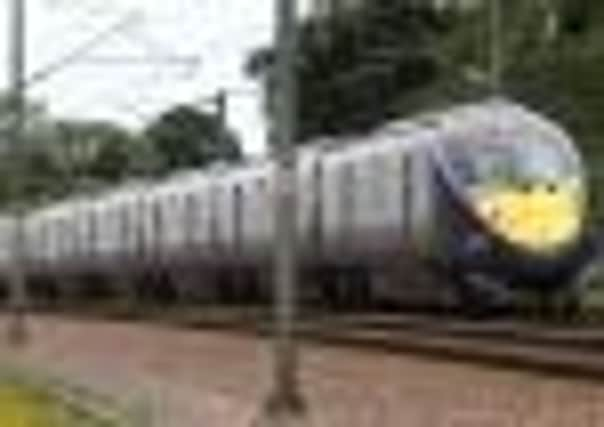Tom Richmond: Cameron can’t afford to backtrack on high-speed rail plan for the North


There is also a growing geographical split in public attitudes towards this ambitious, but necessary venture. In the North, a state-of-the-art railway is vital to helping areas like Yorkshire fulfil their business potential.
In the Home Counties and London, however, the argument is very different: high-speed rail is an expensive folly, and it will also blight the countryside in the constituencies through which the route will pass.
Advertisement
Hide AdAdvertisement
Hide AdYet, as influential business leaders from this region sign an open letter in support of the scheme, and in direct response to the scheme’s sceptics nearer the capital, it is crucial that the Prime Minister holds his nerve.
The reason that high-speed rail has become such a massive – and controversial – undertaking is because transport planning in this country has been so short-sighted for decades. This is not Mr Cameron’s fault; this culture of complacency even pre-dates his birth.
Any attempt to build a new railway or road along the spine of Britain will, inevitably, encounter opposition because infrastructure improvements and investment have not kept pace with the expansion of the country’s population. Any scheme, large or small, will impact on some families.
However, “doing nothing” is not a viable option. Britain’s roads will only become more congested, and rail routes even more overcrowded, unless high-speed rail – commonplace in other parts of the world – becomes a reality.
Advertisement
Hide AdAdvertisement
Hide AdInstead, a “can do” attitude must prevail – like the spirit shown by Margaret Thatcher, Mr Cameron’s illustrious predecessor, who pressed ahead with the Channel Tunnel in spite of opposition from those opponents, including many prominent Tories, who feared Kent would be ruined forever.
She was right – and they were wrong.
The most significant transport undertaking since the first motorway opened in 1958, it has transformed travel to and from the Continent – while having a minimal impact on the environment.
It is the same with those protesters, epitomised by unsavoury characters like “Swampy”, who tried to stop the construction of major road schemes like the Newbury bypass – or the dualling of the A30 through Devon.
As well as attracting environmentalists, both ventures were heavily opposed by residents – again natural Conservative supporters – who said their lives would be ruined. They were not.
Advertisement
Hide AdAdvertisement
Hide AdIn spite of the disruption during the construction phase, their local environment has been enhanced, and Ministers were right not to back down. Mr Cameron must learn this important lesson from history.
There is also another dividing line over transport that Ministers need to spell out, starting with Transport Secretary Philip Hammond’s visit to Leeds today.
The Home Counties – and particularly Buckinghamshire where anti high-speed opposition is at its most vociferous – already have good road and rail links into the capital. They are taken for granted.
It takes just 35 minutes by train from Milton Keynes, where I grew up, to London Euston. There are several such services every hour. Yet, you have to be extremely fortunate, with the timing of your journey, to travel just from Leeds to Sheffield in 40 minutes or so. Contrast this with the poor state of the railway infrastructure in these parts, and the signalling snarl-up at York that brought services to a standstill on Saturday and, in doing so, inconvenienced the travel plans of thousands of people.
Advertisement
Hide AdAdvertisement
Hide AdThose delayed were not just families undertaking local trips – but people travelling the length of the East Coast Main Line from London to Scotland. It was, frankly, indicative of a railway network that is creaking at the seams.
Such disruption would be minimised with specific routes for high-speed trains, as envisaged by the Government. That has to be welcome. If such services are good enough for France, and other progressive countries investing in similar schemes, they should be more than adequate for Britain. But this should not preclude Ministers, however, from investing in the existing rail infrastructure, both to minimise the chaos experienced by many at the weekend and to improve the comfort and reliability of commuter services.
And, while it is accepted that the public finances are under immense strain, it seems odd that the Government is not doing more to pressurise the train operators to set aside more money for new rolling-stock and other improvements – even if this means ‘ring-fencing’ a chunk of the additional revenue that is being accrued from fare increases.
This is why Mr Cameron needs to demonstrate a twin-track approach to the railways. He needs to guarantee improvements to existing services, particularly on chronically overcrowded commuter routes, while pressing ahead with his high-speed rail vision. As well as making a lasting difference to the economy of the whole country, the successful introduction of high-speed can prove to the world that Britain is a go-ahead country.
Advertisement
Hide AdAdvertisement
Hide AdYet, if Mr Cameron fails, it will be even more difficult for his successors to tackle Britain’s transport crisis. That is why the national interest must trump the Conservative Party’s short-term electoral considerations.
He said as much during a symbolic visit to Shipley in late May last year, his first trip to an English region since becoming PM. There, he signalled the coalition’s intention to narrow the North-South divide with policies like high-speed rail.
If it was right then, it is even more justified now.